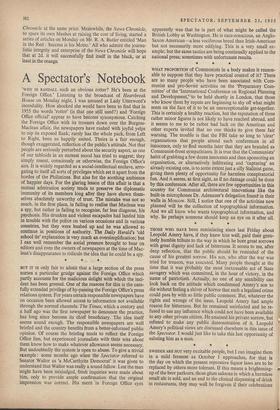A Spectator's Notebook
`WHY IS RANDALL such an obvious rotter? He's been at the Foreign Office.' Listening to the broadcast of Heartbreak House on Monday night, I was amused at Lady Utterword's incredulity. How shocked she would have been to find that in 1955 the words `rotter' (is that one still used?) and 'Foreign Office official' appear to have become synonymous. Catching the Foreign Office with its trousers down over the Burgess- Maclean affair, the newspapers have rushed with joyful yelps to nip its exposed flank; rarely has the whole pack, from Left to Right. been so happily united. Theirs is a 'fair enough, though exaggerated, reflection of the public's attitude. Not that people are seriously perturbed about the security aspect, as one of our tabloids in an earnest mood has tried to suggest; they simply resent, consciously or otherwise, the Foreign Office's airs. It is widely regarded as a social-intellectual enclave, arro- gating to itself all sorts of privileges which set it apart from the hordes of the Philistines. But alas for the soothing ambience of happier days. For the glaring lesson of this affair is that a mutual admiration society tends to preserve the diplomatic immunity of its members long after they have shown them- selves absolutely unworthy of trust. The mistake was not so much, in the first place, in failing to realise that Maclean was a spy, but rather in failing to recognise, far less diagnose, his psychosis. His drunken and violent escapades had landed him in trouble with the police on various occasions and in various countries, but they were hushed up and he was allowed to continue in positions of authority. The Daily Herald's 'old school tie' explanation is very much an oversimplification; but I can well remember the social pressure brought to bear on editors and even the owners of newspapers at the time of Mac- lean's disappearance to ridicule the idea that he could be a spy.
































 Previous page
Previous page